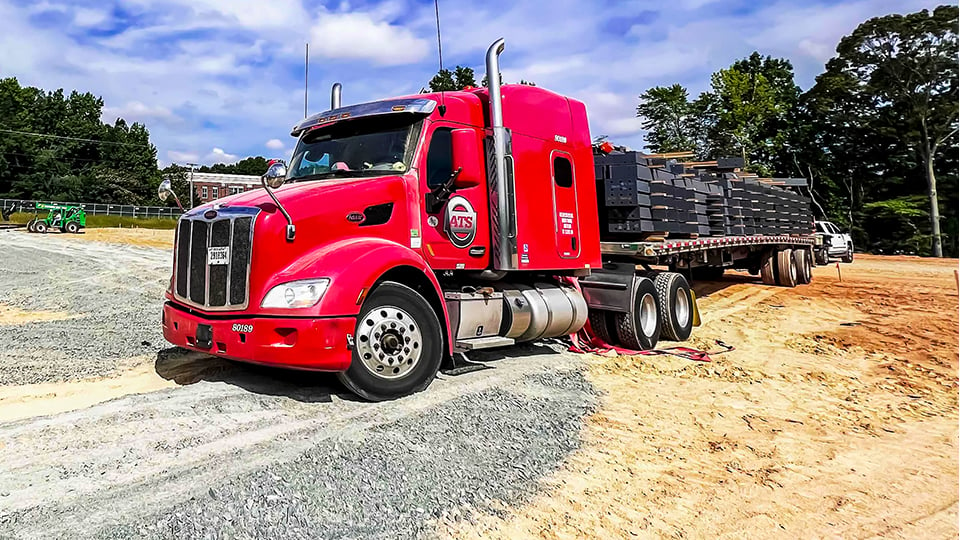Breakdowns are a realistic and common scenario in the trucking industry. With drivers and equipment each traveling hundreds of miles each day, it’s inevitable that sometimes the unexpected and unfortunate will occur.
You’ve probably seen a broken-down truck along the side of the road or at a rest stop. Have you ever wondered what happens to the cargo being transported?
If you’re responsible for that cargo, you definitely wonder what will happen. You signed a contract to have the freight transported based on the needs of your business, and you need that freight to arrive on time. So what happens if the truck hauling your freight breaks down?
At Anderson Trucking Service (ATS), our drivers collectively put on hundreds of thousands of miles each year. That means we have trucks everywhere in the country every day. Despite a disciplined and thorough maintenance schedule, the reality is, sometimes, trucks break down. Fortunately, our experienced staff knows what to do to get the truck and freight moving again as soon as possible.

While there may be nothing we can say to help ease that initial panic when you hear that there’s a problem with your shipment, we can help explain your ongoing role and the carrier’s ongoing responsibility.
You will learn:
- Why breakdowns occur
- The driver’s first priority
- Your role when a truck breaks down
- What happens to your freight
Why Do Truck Breakdowns Occur?
With drivers nationwide carrying freight millions of miles every day, it is inevitable that a truck will sometimes break down. Even a well-maintained vehicle is vulnerable to blown tires, air leaks, burnt out lights, cracked windshields, blown out airbags, weather hazards, hazards on the road and other breakdown risks. Even simple incidents like a cracked windshield may legally require the truck to stop while it is repaired.
Unfortunately, breakdowns are never completely preventable. Truck owners, carriers and brokers want their vehicles on the road and are naturally incentivized to keep their fleet well maintained. Drivers lose valuable time when their trucks break down, so they complete regular inspections before getting on the road and address any potential problems as soon as possible. But even with these precautions, breakdowns will still occur.
As the customer, there is no way for you to prevent breakdowns. But there are things you can do to help most efficiently deal with them if they occur.
Most importantly, talk with your carrier about the age/condition of their fleet as well as their breakdown protocols, and make sure you are comfortable with their standards. Beyond that, understand that while breakdowns are an everyday occurrence nationwide, they are still rare overall.
The Truck Driver’s First Priority: Safety
After a breakdown or accident, the first thing the driver will do is assess for safety.
- If possible, this means getting off the road and to a safe place.
- The driver will help everyone involved find a secure location before moving on to next steps.
When assessing carriers, their carrier safety protocol is one thing you can ask about. It’s not only during breakdowns that safety matters, it’s every time the truck is on the road.
After ensuring that everyone is safe, the driver will contact their headquarters team to report the situation. Good carriers or brokers have a nationwide network of truck stops and repair shops to work with immediately. If local resources aren’t available, they may send another driver to help assess and repair the problem as soon as possible, or to pick up the load and carry it to the next stop.

If the Truck Breaks Down, Will My Delivery Be Late?
The carrier’s or broker’s headquarters team will contact the one receiving the freight, as well as the shipper, as soon as possible. Regardless of vehicle status, the carrier is still obligated to meet your expectations.
As the customer, you will determine next steps.
- Expect your carrier or broker to be in regular contact with you. Whether it is the driver or someone from their headquarters, you should be regularly apprised of options, potential timelines and changes to the plan.
- It will likely be a fluid situation, so some things may change between calls.
- Rely on the carrier/broker’s expertise, ask questions and expect them to work in your best interests and keep you updated.
You will likely have options that range from waiting for the repair to getting the load moving again as soon as possible. Your choice will depend on what you are shipping as well as your needs and timeline. Don’t be afraid to ask clarifying questions along the way as you work with the carrier.
Simple truck breakdowns often occur with no damage to the freight being transported. But more serious breakdowns or accidents can cause damage or delays that affect the freight.
What If My Freight Is Damaged During a Truck Breakdown or Accident?
If your freight is damaged, this is another instance where you can count on consistent and clear communication from your carrier or broker. Whether minor bumps to a few units or a catastrophic loss, if there is any damage the carrier’s claims department will contact you and get you started with the cargo claims process.
Although you will probably have a new contact person when you file a claim, you can still expect a knowledgeable and thorough explanation of what is happening. Ask for timelines and regular updates, as each claim will vary depending on the type and severity of the claim.
If you have taken out additional cargo insurance, this is also the time to work with that company. Insurance can help you recoup your losses when a breakdown or accident damages your freight.
Stay Calm When Truck Breakdowns Happen
When a truck breaks down, the most important thing you can do is stay calm and communicate with your carrier or broker. They have real world everyday experience with truck breakdowns and delays, as well as an obligation to meet your needs as best they can.
It’s important to emphasize that truck breakdowns are a rare occurrence overall. While you can’t and shouldn’t go into your shipment expecting the worst, having some information about next steps can help you confidently work with your chosen transportation provider in case things don’t go exactly as planned.
Learning the “why” and “what can I do” about truck breakdowns has hopefully given you some specific knowledge to use when you first contact a freight carrier or broker.



